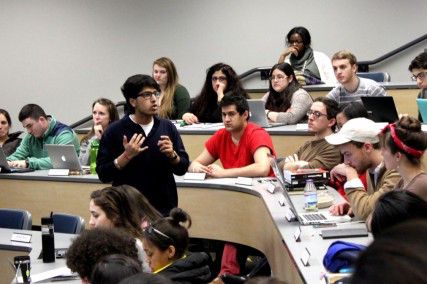
Student Government members passed a proposal Monday stating the student body’s support of a section of a Massachusetts Bay Transportation Authority extension plan dealing with improvements to the T.
The proposal urges Massachusetts legislators to consider funding an extension of T service hours on Friday and Saturday nights from midnight to 2 a.m., said SG Director of Advocacy and spokesman Saurabh Mahajan.
“What we have in front of us is a plan from the Massachusetts State Governor [Deval Patrick]’s office, but it’s not a bill,” Mahajan, a College of Arts and Sciences freshman, said.
SG’s proposal is essentially a statement of support of Patrick’s “The Way Forward: A 21st Century Transportation Plan,” specifically the “State of Good Repairs” section of the plan, which discusses improvements to Boston’s subway system, Mahajan said.
Although the section does not specifically mention an extension of T hours, the proposal urges Massachusetts’s legislators to consider this as part of improvements.
Mahajan said extension of T hours provides a necessary service for student safety.
“The T is a safe, affordable and reliable way to get home for students,” he said.
SG Vice President Lauren LaVelle said the transportation plan is an opportunity for SG to assist in improving the city of Boston.
“We saw an opportunity to do something in the real world, to do something on a larger scale,” LaVelle, a School of Management junior, said. “We can leave a legacy here that has bigger implications than Boston University.”
SG officials hope to work with student body governments at other universities to issue a similar statement from multiple supporters, including Harvard University and Simmons College, Mahajan said.
“Fellow student governments in the Boston area, they are going to look at the same resolution and do what we just did today, and then they are going to vote within their bodies,” he said. “For all the schools that pass it that want to be a part of this, their presidents are going to meet together for a press conference.”
Officials also announced a town hall meeting March 5 where Allocations Board members will announce changes to policies on lending student groups money for charitable events.
The meeting will take place at 7 p.m. in the Photonics Center in room 206.
SG officials tabled a dialogue on an amendment to the SG constitution proposed by fall 2012 Student Body President Dexter McCoy for the next senate meeting. The amendment would create an Executive Board that would bring together members of the Allocations Board, Residence Hall Association and SG.
“It creates a more centralized body of leadership on campus,” McCoy, a College of Communication junior, said.
McCoy said the Executive Board would create benefits for students by bringing together essential functions of the student body to work on problems within BU.
Under the proposed amendment, the Executive Board would be comprised of the Allocations Board Chair, the College Government President’s Council Chair, the RHA President, the SG Vice President and the Student Body President. The board would meet at least once a week.
Mahajan said the proposed amendments might help students by establishing a unified body that emphasizes communication, working together, a unified leadership and a center of government.
The proposed amendments would allow more students to become familiar with leaders and how to contact them, McCoy said.
“Students should be the ones at the table discussing things on campus,” McCoy said. “Because we are so segmented right now, that conversation does not happen. That conversation really can’t happen because we’re not all a part of the same body.”
This is an account occasionally used by the Daily Free Press editors to post archived posts from previous iterations of the site or otherwise for special circumstance publications. See authorship info on the byline at the top of the page.



